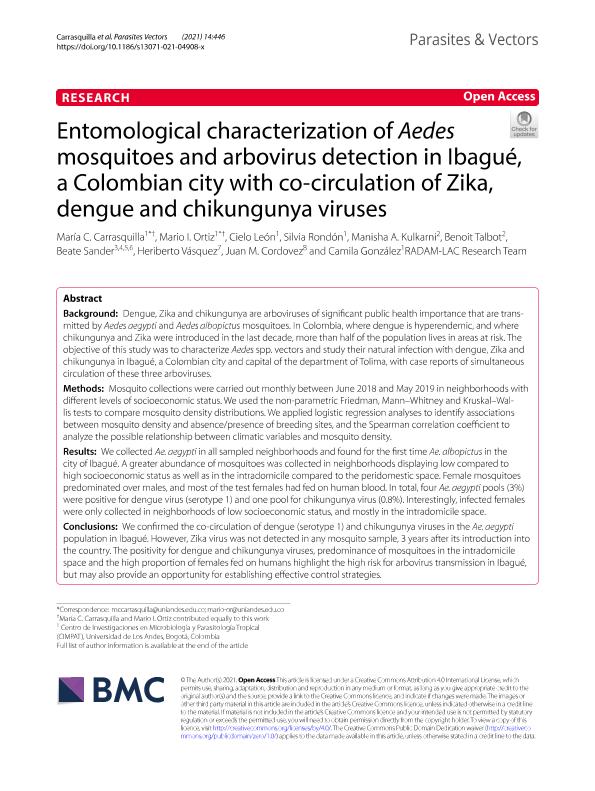Artículo
Entomological characterization of Aedes mosquitoes and arbovirus detection in Ibagué, a Colombian city with co‑circulation of Zika, dengue and chikungunya viruses
Carrasquilla, Maria Cristina; Ortiz, Mario I.; Miretti, Marcos Mateo ; Rondon, Silvia; Kulkarni, Manisha A.; Talbot, Benoit; Beate Sander; Vásquez, Heriberto; Cordovez, Juan M.; Gonzalez, Camila
; Rondon, Silvia; Kulkarni, Manisha A.; Talbot, Benoit; Beate Sander; Vásquez, Heriberto; Cordovez, Juan M.; Gonzalez, Camila
 ; Rondon, Silvia; Kulkarni, Manisha A.; Talbot, Benoit; Beate Sander; Vásquez, Heriberto; Cordovez, Juan M.; Gonzalez, Camila
; Rondon, Silvia; Kulkarni, Manisha A.; Talbot, Benoit; Beate Sander; Vásquez, Heriberto; Cordovez, Juan M.; Gonzalez, Camila
Fecha de publicación:
09/09/2021
Editorial:
BioMed Central
Revista:
Parasites and Vectors
ISSN:
1756-3305
Idioma:
Inglés
Tipo de recurso:
Artículo publicado
Clasificación temática:
Resumen
Dengue, Zika and chikungunya are arboviruses of significant public health importance that are transmittedby Aedes aegypti and Aedes albopictus mosquitoes. In Colombia, where dengue is hyperendemic, and wherechikungunya and Zika were introduced in the last decade, more than half of the population lives in areas at risk. Theobjective of this study was to characterize Aedes spp. vectors and study their natural infection with dengue, Zika andchikungunya in Ibagué, a Colombian city and capital of the department of Tolima, with case reports of simultaneouscirculation of these three arboviruses.Methods: Mosquito collections were carried out monthly between June 2018 and May 2019 in neighborhoods withdifferent levels of socioeconomic status. We used the non-parametric Friedman, Mann?Whitney and Kruskal?Wallistests to compare mosquito density distributions. We applied logistic regression analyses to identify associationsbetween mosquito density and absence/presence of breeding sites, and the Spearman correlation coefficient toanalyze the possible relationship between climatic variables and mosquito density.Results: We collected Ae. aegypti in all sampled neighborhoods and found for the first time Ae. albopictus in thecity of Ibagué. A greater abundance of mosquitoes was collected in neighborhoods displaying low compared tohigh socioeconomic status as well as in the intradomicile compared to the peridomestic space. Female mosquitoespredominated over males, and most of the test females had fed on human blood. In total, four Ae. aegypti pools (3%)were positive for dengue virus (serotype 1) and one pool for chikungunya virus (0.8%). Interestingly, infected femaleswere only collected in neighborhoods of low socioeconomic status, and mostly in the intradomicile space.Conclusions: We confirmed the co-circulation of dengue (serotype 1) and chikungunya viruses in the Ae. aegyptipopulation in Ibagué. However, Zika virus was not detected in any mosquito sample, 3 years after its introduction intothe country. The positivity for dengue and chikungunya viruses, predominance of mosquitoes in the intradomicilespace and the high proportion of females fed on humans highlight the high risk for arbovirus transmission in Ibagué,but may also provide an opportunity for establishing effective control strategies.
Archivos asociados
Licencia
Identificadores
Colecciones
Articulos(IBS)
Articulos de INSTITUTO DE BIOLOGIA SUBTROPICAL
Articulos de INSTITUTO DE BIOLOGIA SUBTROPICAL
Citación
Carrasquilla, Maria Cristina; Ortiz, Mario I.; Miretti, Marcos Mateo; Rondon, Silvia; Kulkarni, Manisha A.; et al.; Entomological characterization of Aedes mosquitoes and arbovirus detection in Ibagué, a Colombian city with co‑circulation of Zika, dengue and chikungunya viruses; BioMed Central; Parasites and Vectors; 1; 14; 9-9-2021; 1-14
Compartir
Altmétricas



